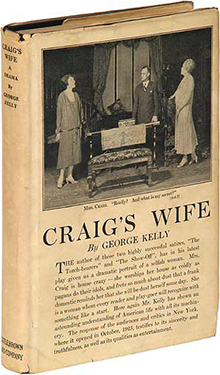| Craig's Wife | |
|---|---|
 First edition 1926 | |
| Written by | George Kelly |
| Characters |
|
| Date premiered | October 12, 1925 |
| Place premiered | Morosco Theatre New York City, New York, US |
| Original language | English |
| Genre | Drama |
| Setting | The Reception Room at the Home of Mr. and Mrs. Walter Craig |
Craig's Wife is a 1925 play written by American playwright George Kelly. It won the 1926 Pulitzer Prize for Drama, [1] and has been adapted for three feature films.


